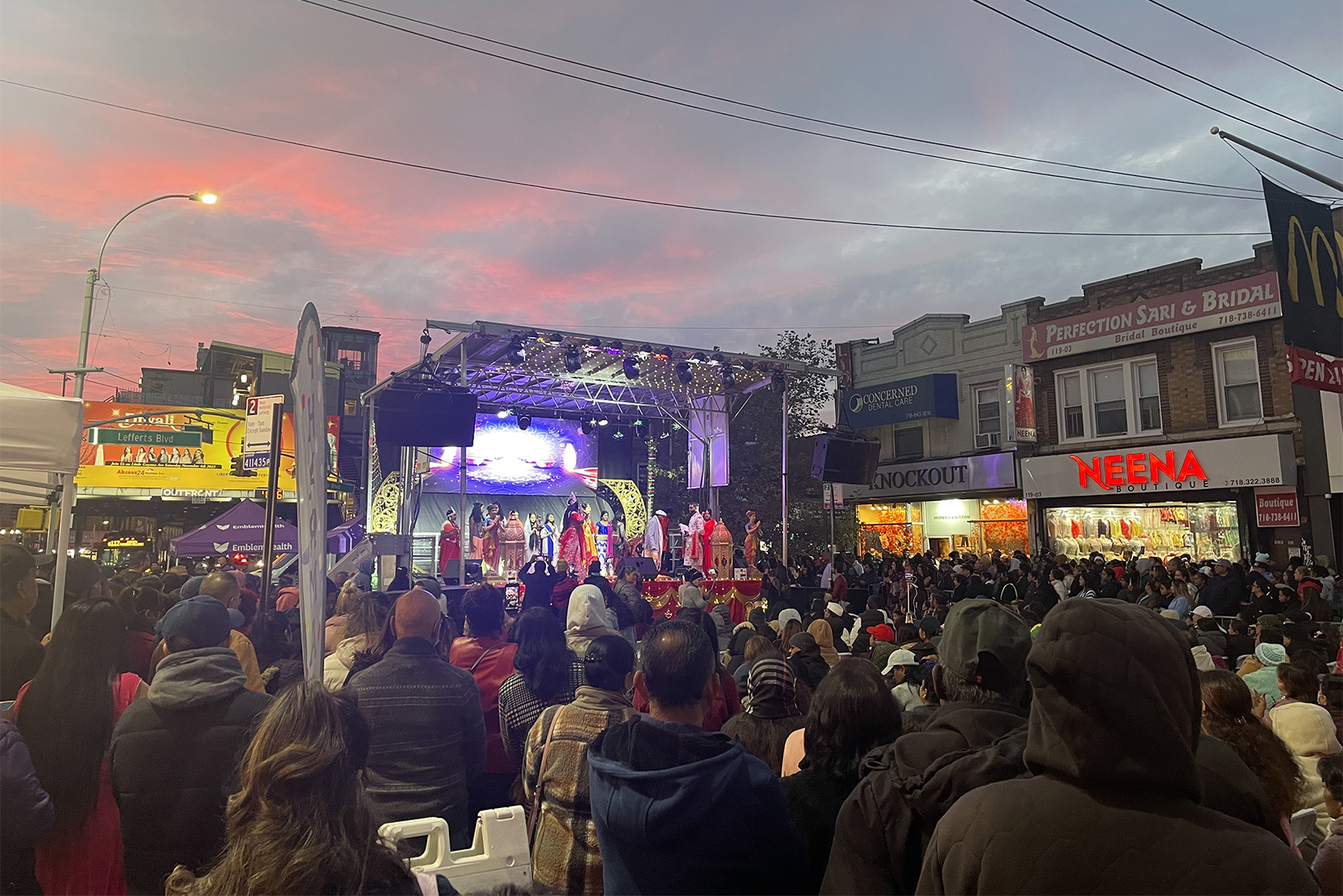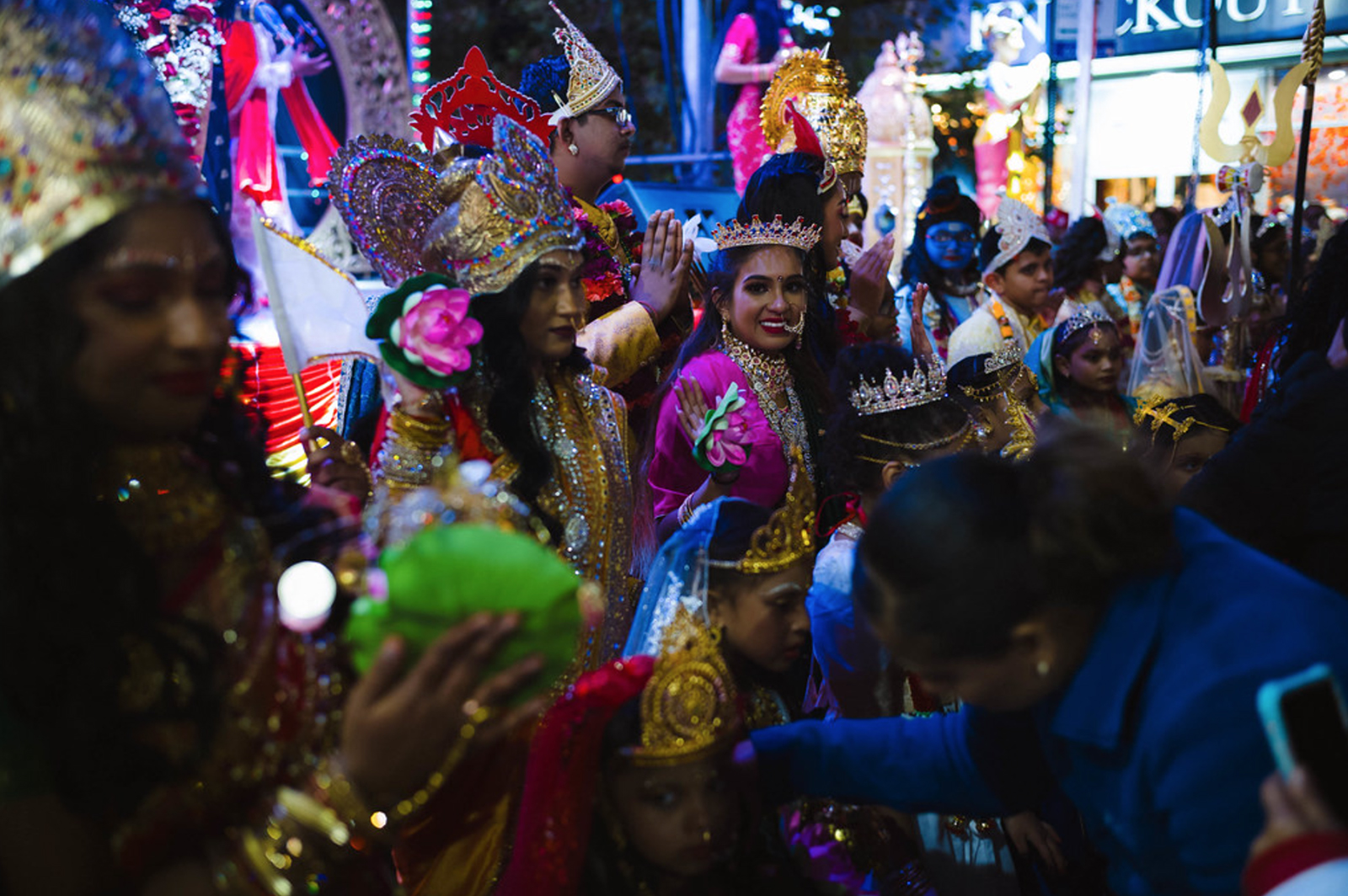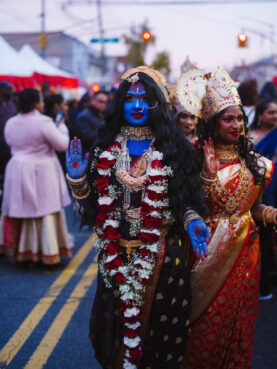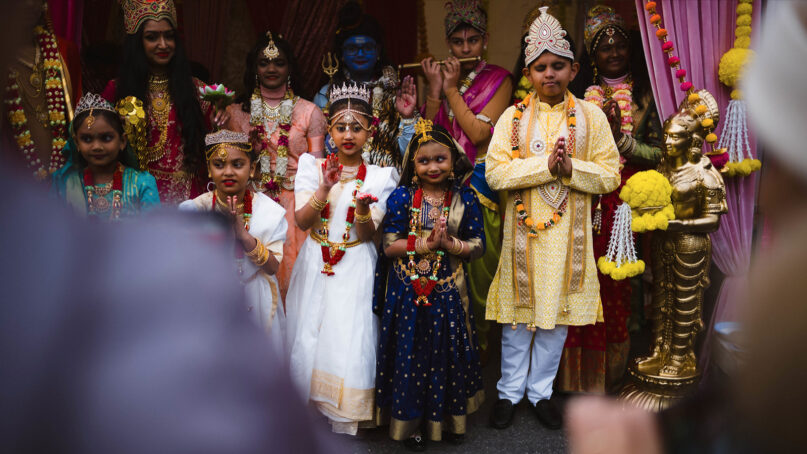NEW YORK (RNS) — As this year’s Diwali Motorcade passed through the heart of Ozone Park, Queens, last weekend, Lakshmee Singh explained how the parade, which her mother helped launch more than 30 years ago, is at once her inheritance and the future of her largely Hindu immigrant community.
“We were around when there was nothing, and we helped build this religious community,” said Singh, standing at the corner of Lefferts Boulevard and Liberty Avenue, a crossroads of the neighborhood known as Little Guyana for its dense population of families who trace their history to the Caribbean nation on the shoulder of South America.
“It’s just pride to say you could leave your motherland and still come to America and hold onto your religion and culture, and be proud of it, not hide it,” said Singh, the host of a local Indo-Caribbean talk show that airs in both Queens and Guyana.
On the floats rolling down Liberty Avenue, dancers honoring Mother Lakshmi, the goddess of wealth and prosperity, combine the flair of Indian Bollywood with the Caribbean beat of the tassa drum, echoing the mixed heritage of Indo-Caribbean Hindu culture. It’s a heritage Singh hopes will be carried forward by the ranks of children dressed up in intricate costumes marching in the signature poses of Lord Rama, Mother Kali and other deities.
“It’s something inside of me that connects me,” said Singh. “When I see some of these kids dressed up I really feel that they are the true embodiment of our different gods.”
For New York’s West Indian Hindus, the festivities surrounding Diwali — when Hindus all over the world light oil lamps or candles to celebrate knowledge overcoming ignorance — are a chance to spark cultural belonging among the community’s youth.
Arguably the most well-known of Hindu holidays, Diwali, or the festival of lights, has become increasingly recognized outside India. New York Public Schools declared it an official holiday for the first time in 2023 — and, though the festival falls on Sunday (Nov. 12) this year, Singh says the message remains just as meaningful.
“Now they get to see it in their everyday life, that they’re not just getting off for Christmas or New Years or an election, but they get off for Diwali, too,” said Singh. “It makes them feel like they count.”

Attendees watch the stage during Diwali Motorcade in the Little Guyana neighborhood of Queens, New York, Saturday, Nov. 4, 2023. (RNS photo/Richa Karmarkar)
The idea behind this larger-than-life Diwali celebration, Singh says, is to keep the unique cultural heritage of Indo-Caribbeans alive and well. Indian people who come from Guyana, Trinidad and Tobago, Suriname and Jamaica, she says, are strongly tied to their religious and ethnic roots in India, while remaining true to the country they came to.
“There was a time when we were considered not Indian,” she said. “But the West Indian kids here, they may know hip-hop and rap and everything that’s going on, but at the end of the day, they still know about their religion, and they know how to embrace growing up in a Western world while being close-knit with their culture.”
Indians migrated to the Caribbean starting in the late 1800s, many of them tricked by the British Raj into working as indentured laborers once they touched ground. When they migrated, many of them brought nothing more than their ethnic clothing and some staple foods, and most importantly to many, a deeply religious culture.
Despite their hardships, many say, Indo-Caribbeans clung to their spirituality in the form of bhajans (devotional songs) and mantras (chants).
In the ’70s and ’80s, a large number of West Indians moved to New York City to areas of Brooklyn and Queens. The first immigrants started worshipping at small “satsangs” (or gatherings) in their basements. But as more priests came over, Queens became saturated with temples, partly thanks to the efforts of Hindus like Singh’s mother, Dolly.

People participate in the annual Diwali Motorcade in the Little Guyana neighborhood of Queens, New York, Saturday, Nov. 4, 2023. (Photo © Mat McDermott)
Now, over 300,000 West Indians reside in Queens. And among them are observant Hindus who celebrate Diwali with a special fervor and a distinct understanding of Hinduism.
“Diwali is the kindling of that light within, which should last the whole year,” said Acharya Arun Gossai, the spiritual leader of Bhuvaneshwar Mandir in Ozone Park. “When you keep that light of knowledge, knowing that you are more than this body and mind, but you’re that peace within, when you keep it burning forever, that can change you. And that changed me as a young kid.”
Gossai, who was born in Guyana but came to the U.S. as a baby, was passed down the role from his father, the late Shri Prakash Gossai — a highly regarded priest and bhajan singer who helped to build many of the original temples. Inspired by his father, Gossai left his job in accounting to study Hindu philosophy in India for three years, learning Hindi and Sanskrit under the Chinmaya Mission.
“I am just very fortunate and blessed that I took the time to leave everything just to go to India and get this knowledge and come back so that we can start igniting various lights instead of just one,” he said.
Most Indo-Caribbean people lost the ability to speak Hindi, he explains, the most-spoken language in India besides English. But they gained a deeper understanding of their Scriptures, the Bhagavad Gita and Ramayana, thanks to English translations and explanations.
This fact allows the mandirs in Queens to reach more Indo-Caribbean American youth, he notes. When Gossai took over the helm of the temple, he made it a point to reach kids in particular. His mandir now holds a youth leadership talk every week and a weeklong summer camp to immerse the children in practical spirituality.
“People are not only lighting diyas, but they’re understanding why,” he said. “This is what the younger generation wants. They want explanations, scientific proofs and the logic of spirituality, rather than blind faith.”
“The basic premise of Hinduism is, don’t look for happiness outside of you, look for it within yourself,” he continues. “We teach them ways and means of actually finding that inner peace. We teach the same knowledge that our great-grandparents brought from India.”
Queens resident and community organizer Rohan Narine grew up in and around the temples because of his uncle, who runs the Shri Trimurti Bhavan. While he recalls a sense of familial responsibility that initially characterized his faith, he became more and more spiritual as time went on. Now, he turns to the Bhagavad Gita as his “go-to source of strength.”

A girl dressed as Kali at the Diwali celebrations in Queens, New York, Saturday, Nov. 4, 2023. (Photo © Mat McDermott)
“When Arjuna (the protagonist from the Sanskrit epic “Mahabharata”) went down on one knee, that really hurt me,” he said. “These are analogies that play out even today. To have that knowledge, I took that as a gift.”
The West Indian Hindu way of worship, he says, may look slightly different from East Indian Hinduism. The priest, for example, often gives long sermons called pravachans, where his or her oratory skills and storytelling abilities are at the forefront. And worshippers are often referred to as congregants, often gathering together on Sundays: “That person who can speak the most eloquently is who our people consider as the middle man between us and the murtis,” said Narine, who gave his first pravachan at age 15.
“We really grew up on seeing our spiritual leaders take us to the promised land by being on a podium.”
When Narine co-founded Sadhana, a coalition of progressive Hindus, with his wife in 2011, however, he faced backlash from the broader Hindu community for his efforts to bring East and West together.
“We were branded as fake Hindus, that we didn’t speak the language, that we were proxy-spiritualists,” he said. “We just wanted to increase our awareness of our version of Hinduism in the media. We were not surface-level. We did want to put our faith into practice.”
Even so, he and his wife continue to work on projects that center their Indo-Caribbean Hindu heritage. The couple founded the Prithvi Project, an environmental initiative mobilizing Hindus, especially youth, based on the Dharmic tenet of nonviolence.
And Narine was part of a group of chanters with the Caribbean Equality Project at last year’s Diwali Motorcade celebration who pushed for the holiday to become a statewide one.
“We’re not all lost. Just because we lost that mother tongue doesn’t mean we lost the majority of our faith,” said Narine. “Even today, you can see that our mandirs are thriving. There’s a resurgence of young Hindu priests that are coming up in our community. We have a lot to offer and a lot to give right now.”
Singh, on her show “Let’s Talk with Lakshmee,” hopes to amplify the voices of her Indo-Caribbean neighbors. She recalls a story from 2009, the year she took over her mother’s Diwali celebration, when a Guyanese man thanked her profusely for “bringing a piece of home” to his young daughter.
“While we lost our language, we never lost our soul,” she said. “We never lost the culture that’s in our blood.
“I feel Diwali will always be successful in our little Indo-Caribbean land.”





